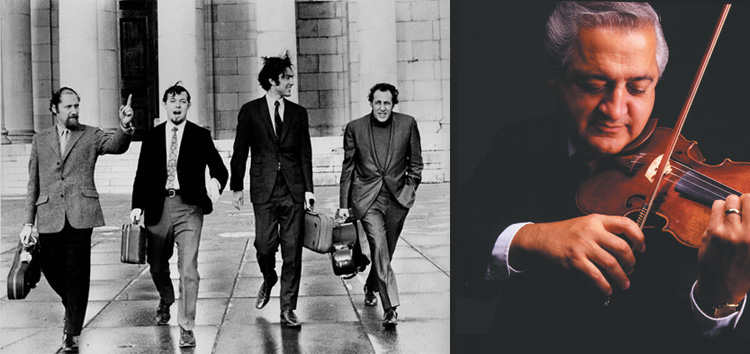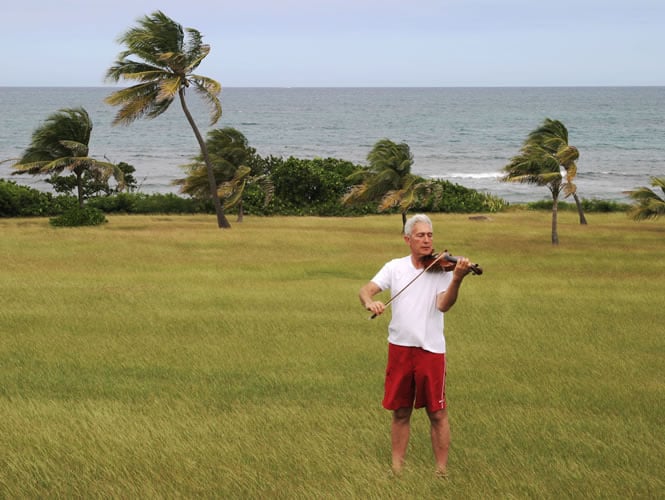.jpg) The Guarneri String Quartet (photo by Erwin Fischer) and Charles Avsharian
The Guarneri String Quartet (photo by Erwin Fischer) and Charles Avsharian
Arnold Steinhardt and I have shared decades of wonderful times beginning back in the ‘60s when we both participated in the Marlboro Festival. We had also been on a tour together where he was the featured young artist and I was in the small chamber group backing him. While we both studied under Ivan Galamian at the Curtis Institute and Meadowmount, it wasn’t until later that we actually met and formed a long-lasting friendship. Our mutual friends were many… all fun-loving young men and women from the finest musical backgrounds. What we all had in common was our passion for music… and having as many laughs as possible. Over the years, I’m happy to report, our strong link of a warm friendship has never waned.
We have kept up our happy valued relationship over the years… through the family times, the Guarneri times, my SHAR years, publishing the quartet’s Beethoven quartets (including some hours of amazing, unpublished videos made in his family apartment in NYC), dozens of concerts, and continuing up through current times. I can’t remember a time when a broad smile wouldn’t spread across my face after having lunch together or just hanging out for a while. Arnold is just that sort of person… he brings out what humor and joy you have that might be waiting for a tickle. His writing continues to tickle me… and I am absolutely certain that it will tickle you as well.
Charles Avsharian
CEO, SHAR Products Company
Editor's Note: The following story by Arnold Steinhardt originally appeared on his blog In the Key of Strawberry and is republished with permission. Steinhardt is the founding member of the Guarneri String Quartet and the author of two books: Violin Dreams and Indivisible by Four. For more stories visit here or follow on Twitter.
"Tom" by Arnold Steinhardt
I met Tom Heimberg during junior high school recess when we were both twelve years old. The popular sport during recess was something we unofficially called Chinese handball—a game played with a rubber ball against an upright surface. Tom and I became quite professional at discussing topspin, slices, drop shots, and fake outs, but as the summer of 1949 approached, I could not have imagined that our friendship would last a lifetime. What twelve-year-old thinks in those terms?
 Arnold Steinhardt (photo by Dorothea von Haeften)
Arnold Steinhardt (photo by Dorothea von Haeften)
Tom and I shared another skill I soon discovered when I joined the school orchestra. We both played the violin. As one of the less advanced violinists in the orchestra, Tom sat at the very back of the violin section. I, on the other hand, was already quite good for my age and immediately placed by Mr. Ives, the school music teacher and orchestra conductor, next to Clementina, the orchestra concertmaster.
Mr. Ives instituted something called orchestra challenges, which took place every month or so. During challenges, if you were sitting, say, 5th chair cello and you considered yourself better than, say, 2nd chair, you were free to announce a challenge. First the challenger and then the challenged played. Then the whole orchestra delivered their preference by a show of hands.
Challenges were fun. Clementina and I challenged each other at every opportunity for the concertmaster chair. Sometimes she won, sometimes I did. At no time during the semester’s many school challenges, did Tom even seem interested in a better seat in the violin section.
Over the summer, I dutifully practiced many hours daily, with unexpected benefits. When school orchestra recommenced in September, I was voted concertmaster by a significant number. The accomplishment must have gone to my head, however, for I soon learned that fellow orchestra members were annoyed with my behavior. Apparently, I had begun to consider myself God’s gift to the violin.
At the next orchestra challenge, Tom unexpectedly stood up and announced with imperious formality that he, Tom Heimberg, last chair violin, would like to challenge the concertmaster, Arnie Steinhardt, for his chair. There were a few stifled laughs and an astonished half smirk from me, but Tom, undaunted, launched into Brahms’ Hungarian Dance #5. To be honest, his playing was less than wonderful, but rather than responding graciously with a modest solo, I decided to show off my abilities as God’s gift to the violin with Monte’s Czardas, a showpiece in the gypsy style. Afterwards, I smugly sat down with the confidence that I had retained my seat—a confidence that proved unfounded: the orchestra, deciding to have a little fun at my expense, voted overwhelmingly for Tom. Tom swaggered up to the concertmaster chair like a Roman emperor and I was demoted to his place in the back. At rehearsal’s end, however, Mr. Ives said the joke had gone far enough and returned us to our former positions.
For reasons I cannot quite explain, this event sealed Tom’s and my friendship.
Some time ago I came across this graduation inscription in my 1951 junior high school yearbook:
Roses are red,
Violins are blue?
Here’s wishing
luck to you.
— Tom Heimberg
Parodies of the Roses are Red, Violets are Blue poem were often yearbook items, but Tom’s attested to the fact that we already shared some violin history. By then, we had played together in the school orchestra’s violin section for at least a couple of years.
We stayed friends in high school. Common interests undoubtedly held us together—music, of course, but also books and chess (Tom was very good, I mediocre). When we graduated, I went east to the Curtis Institute of Music and Tom rented my room from my parents while he attended college in Los Angeles.
Dad had a philosophy of professional achievement that he repeated endlessly when he heard me practicing: “There is only room at the top,” he would intone solemnly. The message was crystal clear: either I became the next Albert Einstein, Jonas Salk, or in my case, Jascha Heifetz, or I would risk thrashing about in a cruel and unpredictable world. When Tom moved into my room, he took my place in the living room as the resident practicing violinist. He was clearly a gifted musician, but he was still grappling with the instrument’s many difficult hurdles, and when he told my parents he hoped to become a professional musician, they could only sadly shake their heads. A brilliant Phi Beta Kappa student, with a degree in English, Tom clearly had many career possibilities open to him. Yet what hope did he have as a musician in comparison to Mom and Dad’s heroes—Heifetz, Mischa Elman, and Nathan Milstein—the reigning violin stars whose records they listened to worshipfully.
At music school, I soon encountered students already endowed not only with solid musical ability but also with breathtaking virtuosity. They were the musicians who might some day occupy that very small room at the top Dad so often spoke of. But were there no other rooms in the entire profession for someone like Tom? He certainly had the discipline needed for a career in music. His practice habits were faultless. Even his playful orchestra challenge those many years earlier was a clue to his strength of character. But the engine that seemed to drive him ever forward was his passionate and unwavering love of music and the violin (and viola, which he would soon take up). Tom was cut out of a template that I would admire more and more as time went on. One evening, when I was just back from music school, Tom and I sat on our living room sofa and chatted. Unexpectedly, the sound of a songbird coming from an open window began to intrude on our conversation. Finally we stopped talking altogether and listened in rapt silence to a performance of intoxicating beauty and never-ending variety. We listened for the better part of an hour. Without saying it, we must have sensed that there were untold miracles in this world waiting to be discovered and shared as we ventured out into adult life.
One evening, when I was just back from music school, Tom and I sat on our living room sofa and chatted. Unexpectedly, the sound of a songbird coming from an open window began to intrude on our conversation. Finally we stopped talking altogether and listened in rapt silence to a performance of intoxicating beauty and never-ending variety. We listened for the better part of an hour. Without saying it, we must have sensed that there were untold miracles in this world waiting to be discovered and shared as we ventured out into adult life.
You might call the songbird’s concert a small event, but such things were treasures to Tom. As he made his way slowly but surely up the professional ladder—first as a violist in the Oakland Symphony, then the San Francisco Symphony, and finally the San Francisco Opera Orchestra, as well as orchestra manager, teacher, and author—I would hear some of his small stories when I came to visit. I would hear about a gorgeous clarinet solo, about a funny remark from his stand partner, or the latest carpool stories. These vignettes were told with the relish and detail of someone who never lost his wide-eyed love of music, of musicians, of life itself.
Tom Heimberg passed away on November 14, 2006. Since there was no room at the top, Tom created a special space for himself and his viola elsewhere.


